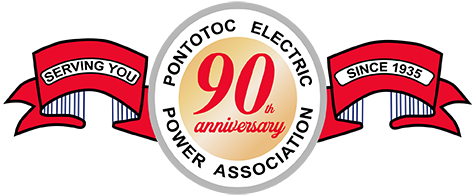What is an Electric Cooperative?
An electric cooperative is a democratic organization. It conducts annual membership meetings, at which the member/owners --- the consumers it serves --- elect a board of directors from among their membership. The directors elect their own officers and employ a CEO/general manager to run the daily operations of the cooperative. Thus, employees are responsible to the manager, the manager is responsible to the board, and the board is responsible to the membership at large. As you can see, the customers of an electric cooperative --- the member/owners --- have the final say in the operation of the cooperative.
A SUCCESS STORY
Much of the progress, economic and social, that has come about in rural Mississippi can be traced almost directly to the creation of electric cooperatives. And that progress continues. Each electric cooperative is an inspiring example of neighbors working with neighbors to make the quality of life better for the entire community. And for us, improving community life means going beyond our primary responsibility to provide dependable electric services at competitive prices.
For more than 85 years, Mississippi’s electric cooperatives have played a vital role in the growth and development of our great state. But our work is not done. We are making plans for tomorrow’s electricity demand today, in order to ensure a dependable supply for the future.

10 Pivotal Moments
The Changes and Events Forming the Story of Pontotoc Electric
On January 23, 1934, the Tennessee Valley Authority made its beginning in rural electrification by setting its first pole to serve rural areas in Pontotoc County, Mississippi. The event was commemorated by a public ceremony held one mile west of Pontotoc on a line that would serve the communities of Springville, Randolph, and Toccopola. An article in the Pontotoc Progress newspaper stated "A Holiday Was Declared and Hundreds Take Part in Pole-Raising Ceremony...Eyes of the Nation on Pontotoc County as Pioneer in Widespread Rural Electrification." This event was significant because it recognized the first TVA power pole in the nine northeast Mississippi counties in which TVA pole construction was scheduled. It signaled the start of rural electrification for the area.
Seven Cooperative Principles
Open and Voluntary Membership
Membership in a cooperative is open to all people who can reasonably use its services and stand willing to accept the responsibilities of membership, regardless of race, religion, gender, or economic circumstances.
Democratic Member Control
Cooperatives are democratic organizations controlled by their members, who actively participate in setting policies and making decisions. Representatives (directors/trustees) are elected among the membership and are accountable to them. In primary cooperatives, members have equal voting rights (one member, one vote); cooperatives at other levels are organized in a democratic manner.
Members’ Economic Participation
Members contribute equitably to, and democratically control, the capital of their cooperative. At least part of that capital remains the common property of the cooperative. Members allocate surpluses for any or all of the following purposes: developing the cooperative; setting up reserves; benefiting members in proportion to their transactions with the cooperative; and supporting other activities approved by the membership.
Autonomy and Independence
Cooperatives are autonomous, self-help organizations controlled by their members. If they enter into agreements with other organizations, including governments, or raise capital from external sources, they do so on terms that ensure democratic control as well as their unique identity.
Education, Training, and Information
Education and training for members, elected representatives (directors/trustees), CEOs, and employees help them effectively contribute to the development of their cooperatives. Communications about the nature and benefits of cooperatives, particularly with the general public and opinion leaders, help boost cooperative understanding.
Cooperation Among Cooperatives
By working together through local, national, regional and international structures, cooperatives improve services, bolster local economies, and deal more effectively with social and community needs.
Concern for Community
Cooperatives work for the sustainable development of their communities through policies supported by the membership.

